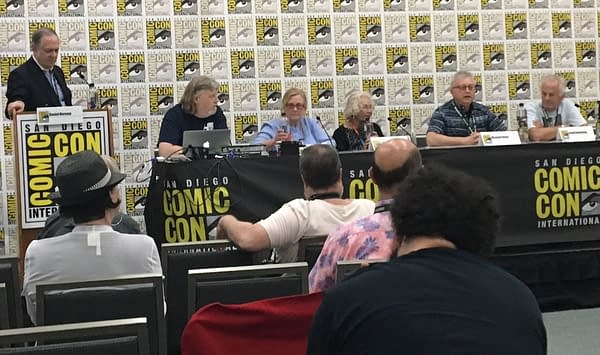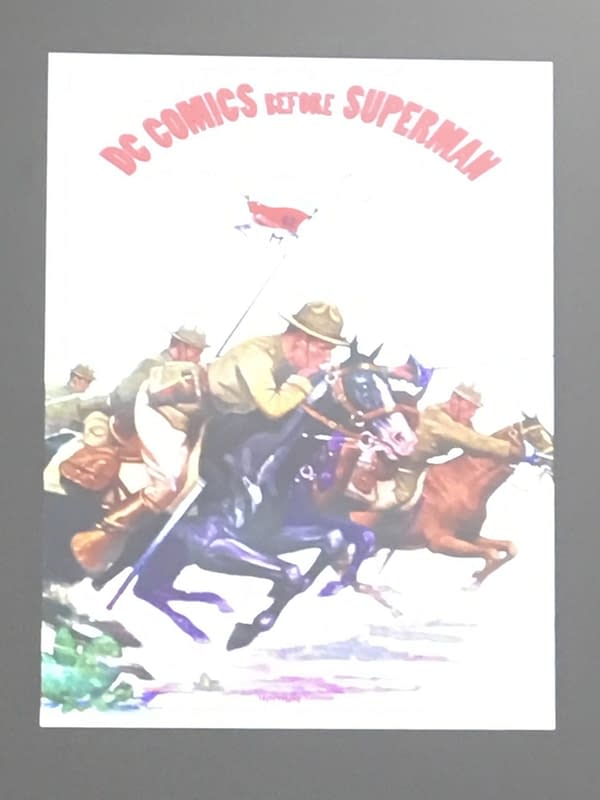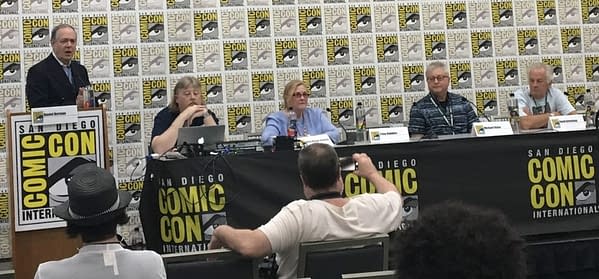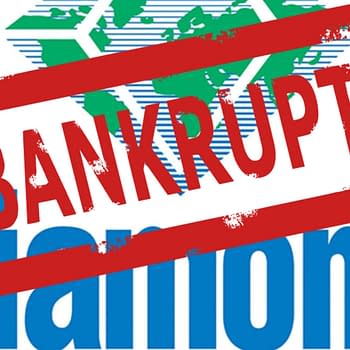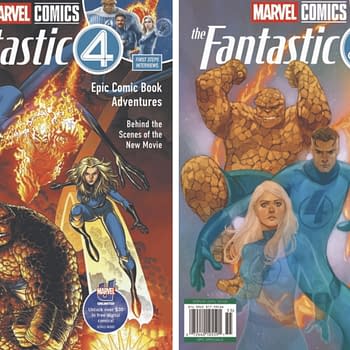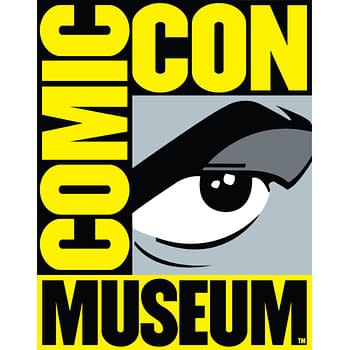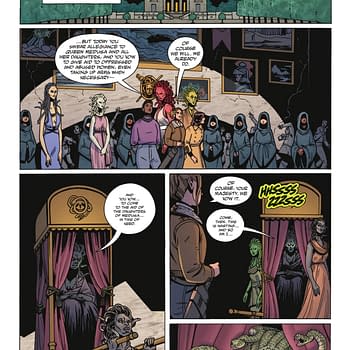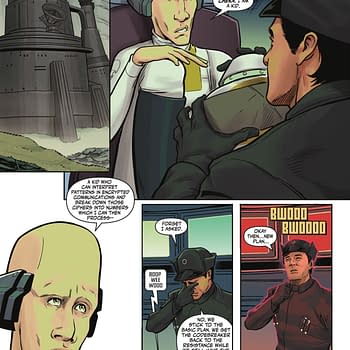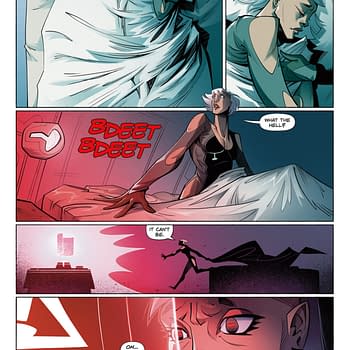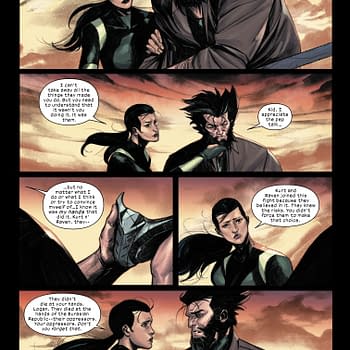Posted in: Comics | Tagged:
Major Malcolm Wheeler-Nicholson: The DC-Before-Superman Panel
By Mike Sangregorio
What is today known as comics publisher DC began life as National Allied, founded by Malcolm Wheeler-Nicholson. The former Major in the US Army was a pulp writer and publisher who took it upon himself to develop the nascent industry of comic books. A new book forthcoming from Hermes Press will shine a spotlight on the details of this story and in turn the origins of DC and the comic industry. It is spearheaded by the Major's granddaughter, Nicky Wheeler-Nicholson, who wants to take control of the narrative around her grandfather which she feels has often been misrepresented and told in an incomplete way.
Friday during Comic-Con saw a panel featuring Nicky, Michael Uslan, comic historian, David Armstrong, researcher, and Trina Robbins, celebrated comic artist. It was moderated by Daniel Herman, founder and publisher of Hermes Press.
The Major wrote many of the stories featured in the comics that preceded the Action Comics title from National Allied. Many of these were adapted from stories for pulp magazines printed only a few years ago. He published New Fun Comics #1 in 1935, the tabloid-sized first comic book from what would eventually become DC. It featured work by, among others, Superman co-creator Jerry Siegel.
Nicky discussed how she has been working on this book for ten years and that it is an immensely personal endeavor for her. It was mentioned that the earliest work of the Major's dates back to at least 1924 and so his career was fully formed before he pioneered comics.
Nicky recounted snippets of the Major's pre-publishing career including hunting for Mexican general Pancho Villa along the US border and participating in a campaign in Mongolia. Adventures such as these allowed the Major to draw from his personal experience to inform his work. Though he transitioned his career to comics he was not at the company long. National Allied was lost to him prior to the publication of Action Comics #1 and the circumstances surrounding this are legend which Uslan believes should be investigated further.
He is convinced that this was not a case of the Major being a poor businessman as was the case with many of the creators who have worked in the comic industry. The Major understood publishing and, after the Great Depression halted his pulp work, he "for some reason began a comic book business, a completely unknown industry."
A story was recounted about how the Major received drawings from Siegel on butcher paper, unprofessional materials that proved how amateur the creator was. One of these was an image of Superman. This began a working relationship between the men which was in place when the Major was forced out by DC's more well known founding fathers Harry Donenfeld and Jack Liebowitz. Uslan recounts that Donenfeld was the Major's printer and that when the Major had to declare bankruptcy it was due mostly to money owed to Donenfeld. This, along with the identity of the individual responsible for handling post-bankruptcy matters in a supposedly fair and independent way being revealed to be "a known Donenfeld associate," makes the case for the Major to have been pushed out of his company by interested parties.
Herman added that the traditional narrative, that the Major "was forced into bankruptcy and the Donenfelds got the company, published Action Comics, and all was right in the world" is a far simpler recounting than what actually happened.
Uslan discussed how he began working at DC during 1972 and that his first job was to clean out 'The Closet.' He compared it to the Warehouse at the end of the film 'Raiders of the Lost Arc.' Among other treasures it contained George Reeves' Superman suit, a Batman suit, the original sales figures of many of DC's earliest titles, 50 to 60 cease and desist letters sent over the years, and various ashcan editions of issues published. After being given express permission to study these for their historical significance Uslan found many interesting facts concerning the Major.
Uslan mentioned that not only did many of the early Superman comics have multiple printings but that "Superman #2 was the first comic to sell over a million copies." He mentioned how the comics industry was open for both profit and corruption. It was mentioned that Donenfeld knew noted figure Frank Costello, sometimes "billed as the Prime Minister of the Underworld."
Nicky was quick to defend Donenfeld as she is not looking to blame anyone and she is hoping that Donenfeld's grandson will write a book about his family's overlapping experiences. Nicky specifically said, "my grandfather was not a victim. This is business. It is difficult and sometimes you lose. The last thing he'd have wanted is for anyone to think of him as a victim."
Of the comics themselves that the Major produced one, a story known as the Blood Pearls, is believed to have been illustrated by Cecilia Munson one of the only known female comic artists of the time. Robbins pointed out that though many believed she was not the creator involved that, among other reasons, it was true based on the fact that a woman's name was credited and that it would have been unthinkable for a man to credit himself that way.
Armstrong was working on this subject in a parallel way for even longer than Nicky. He had interviewed every creator that he could find who was related to the subject, most of whom were in their twenties when the events occurred. He said it was important to remember how anyone is at that age. He said they cared about the work, not the Major himself. He mentioned that one artist could only recall that "he wore spats. He wore a hat. Sometimes there weren't checks so he worked in the office to guarantee he'd get paid."
As far as Nicky and Uslan can tell the Major was bought out for his share of DC because of what he would owe for the bankruptcy. The literal check that the Major received only wiped his debt clean. According to legal records the bankruptcy was finalized in September 1938 but the New Owners had begun with operations as early as April 1938. Between these two events was the publication of Action Comics #1 in June 1938. Uslan believes that the Major had been working on this issue with Siegel, Shuster, and other creators but that Donenfeld and Liebowitz knew of the worth of the company's new line of business and that it would be something worth obtaining.
Uslan added that that the editor of New Fun Comics, Lloyd Jacquet, went on to become a packager of original content for comic publishers who had no talent studio of their own. His company, known as Funnies, Inc., provided content to Martin Goodman for what would see print as Marvel Comics #1. Uslan concludes that it is difficult not to imagine how the industry would be different if the Major had not been pushed out and content such as this had been added to the growing stable of National Allied.
The industry has not entirely forgotten about the Major. His likeness and personal history were used briefly during a recent DC crossover of its Young Animal titles known as Milk Wars. His role was to reinforce the fictional nature of the characters as a part of the story's more meta narrative.


